Months of Meryl: Before and After (1996)
 Wednesday, June 6, 2018 at 11:00PM
Wednesday, June 6, 2018 at 11:00PM John and Matthew are watching every single live-action film starring Meryl Streep.
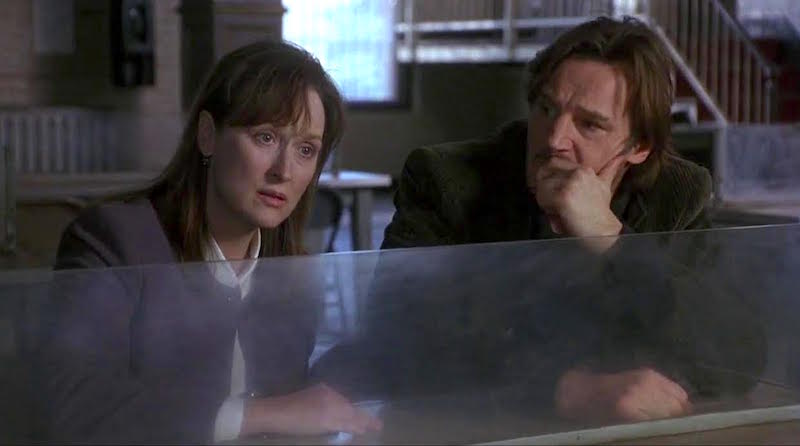
#23 —Dr. Carolyn Ryan, a suburban pediatrician attempting to keep her family together after her son becomes a prime suspect in his girlfriend’s murder.
Before and After is one of those forgettable Streep misfires that appear with a bit more frequency in the latter half of her vaunted career. The tell-tale signs are all here: an appealing but hardly virtuosic director seemingly working on autopilot, bestselling literary source material that maybe didn’t cry out for cinematic treatment after all, and a Northeastern setting in close enough proximity to her Connecticut domicile...
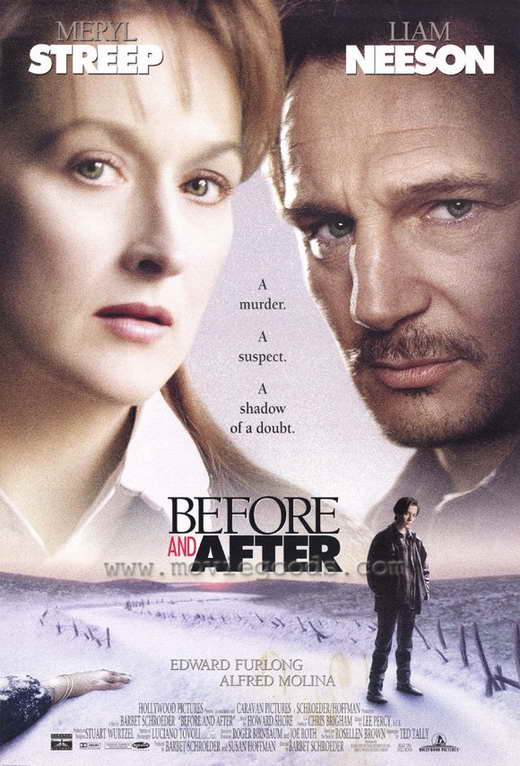 The Swiss Schroeder, helmer of Maîtresse, Barfly, and Reversal of Fortune, as well a slew of documentaries, surely had the credentials to lure both Streep and a prime-period Liam Neeson into the roles of Carolyn and Ben Ryan, a comfortably upper-middle-class Massachusetts clan with a teenage son (Edward Furlong) and daughter (Julia Weldon). When the girlfriend of Furlong’s Jacob ends up gruesomely murdered on the side of the road, the couple struggle to maintain their son’s innocence, a task that becomes especially difficult when Jacob, the last person seen with the victim before her death, disappears.
The Swiss Schroeder, helmer of Maîtresse, Barfly, and Reversal of Fortune, as well a slew of documentaries, surely had the credentials to lure both Streep and a prime-period Liam Neeson into the roles of Carolyn and Ben Ryan, a comfortably upper-middle-class Massachusetts clan with a teenage son (Edward Furlong) and daughter (Julia Weldon). When the girlfriend of Furlong’s Jacob ends up gruesomely murdered on the side of the road, the couple struggle to maintain their son’s innocence, a task that becomes especially difficult when Jacob, the last person seen with the victim before her death, disappears.
Unfortunately, this admittedly intriguing premise begets one of Streep’s most strained and sluggish films that, worst of all, fails to test Streep’s imagination in any appreciable way. Streep, for her part, doesn’t adapt her talents to fit the requirements of the genre: she’s a flummoxed and despondent mother but she doesn’t seem particularly anguished about the increasingly likely possibility of her son running out the remainder of his youth in a jail cell. She never loses her emotional directness, but the simplicity of her playing doesn’t much surprise either.
I kept wishing Streep had the creative space and screen time to attempt something like the decorum-keeping desperation emitted by Joan Bennett and Tilda Swinton, who essayed aiding-and-abetting matriarchs faced with a similar setback in, respectively, the devastating The Reckless Moment (1949) and the elegant adaptation of The Deep End (2001). Sometimes Streep effortlessly shifts the mood of a scene in an unanticipated way, like when Carolyn, post-murder, decides to return to work early and lightly jokes with Ben about receiving a black eye from any one of the townspeople who have already convicted Jacob as a killer in their minds. (Furlong, with his lanky, catatonic, sunken-eyed creepiness easily makes the most vivid impression of anyone in the cast.) But Streep never deepens her character beyond the circumstances spelled out in each scene of the script, and Before and After quite simply needed a gamer director than Schroeder to coax the actress out of her wet-eyed, lockstep reactions.
What did you make of this appointment with the good Dr. Ryan?
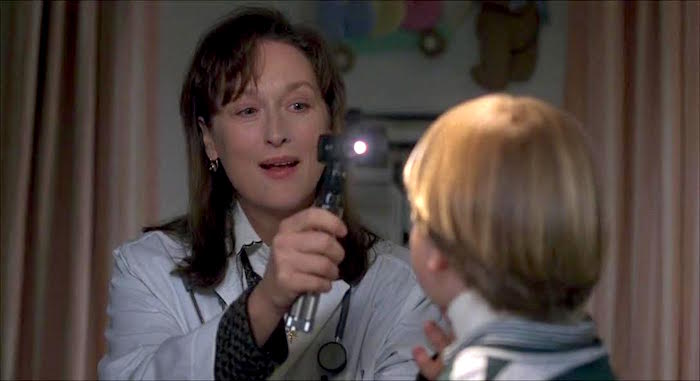
JOHN: Currently adding “Meryl Streep is My Doctor” to my list of fantasies I’d never think to have. I guess you could say that before I saw Before and After, I wouldn’t have fantasized about Meryl Streep being my pediatrician, but after, and this here really is the crucial part, after seeing Before and After, the film caused a reaction. Isn’t it odd how there are befores and afters, and afters sort of… change things? This profoundly astute idea is, of course, the game-changing credo of Before and After. At least The House of the Spirits gave us Streep mistakenly levitating a table on her wedding night; Before and After fails to offer a modicum of pleasure, falling short of even the comic blunders that occasionally arise from movies as bad as this one. Your inspired Bennet and Swinton allusion fails to grasp the utterly dull and maladroit script (from Silence of the Lambs writer Ted Tally, no less) that Streep was handed here. Watching Streep try to enliven the material somehow made me feel seasick, her efforts at characterization, her vitality and, most of all, her emotional expressiveness all fail and the film sinks into clearance-bin oblivion.
In the aforementioned profile, Streep also explains how Schroeder’s hands-off directing resulted in those stagey line-readings and the film’s monotonous pace.
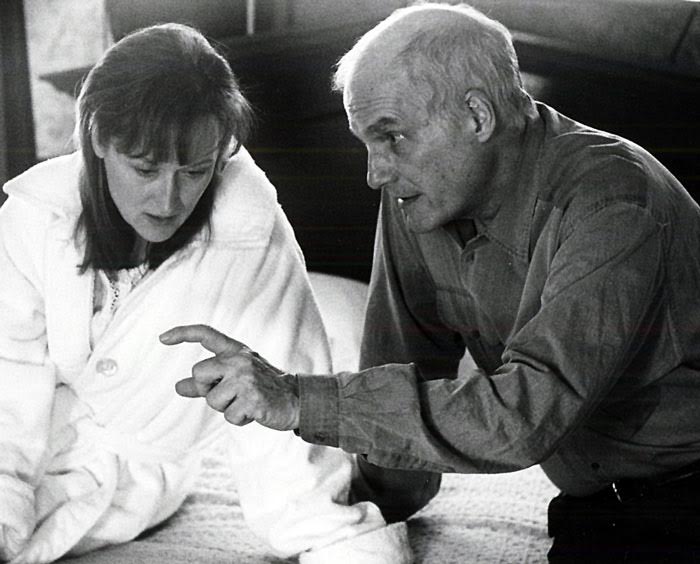 Streep and Schroeder on set
Streep and Schroeder on set
Barbet has done beautiful work. But... I found it difficult. Liam and I had a blast, but it was a stultifying experience. One of the things was that Barbet insisted that words not ever overlap. Everybody had to finish what they were saying. Then the other person would start. It sucked the life out of the scenes for us.”
As Carolyn, Streep has never been as anonymous a presence on screen, so visibly stuck in innumerable dead ends. Streep plays Carolyn’s inner turmoil as surface-level dismay, each revelation inspiring the same reaction. It often feels that Streep has nothing else to play but dismay, choosing to maintain her son’s innocence even when we’re confronted by his nasty attitude and the overwhelming certainty that he killed his pregnant girlfriend. If Streep can be said to have an overarching motivation in the film, it is Carolyn’s valiant pursuit of truth, demanding honesty from her son, husband, and sleazeball lawyer (Alfred Molina) rather than be complicit in a cover-up scheme.
A Streep performance is often guided by a sense of such truth-telling, especially those that are harder to swallow or accept; however, like so much else in Before and After, Streep is only nominally wrestling with emotions and ideas that have become utterly abstracted from the situation and characters at-hand. Carolyn is quickly recast as a naïve gull. Even Carolyn’s pivotal late-film testimony, in which she reveals the true nature of the crime, defying both her husband and their lawyer, is curiously obscured from our view.
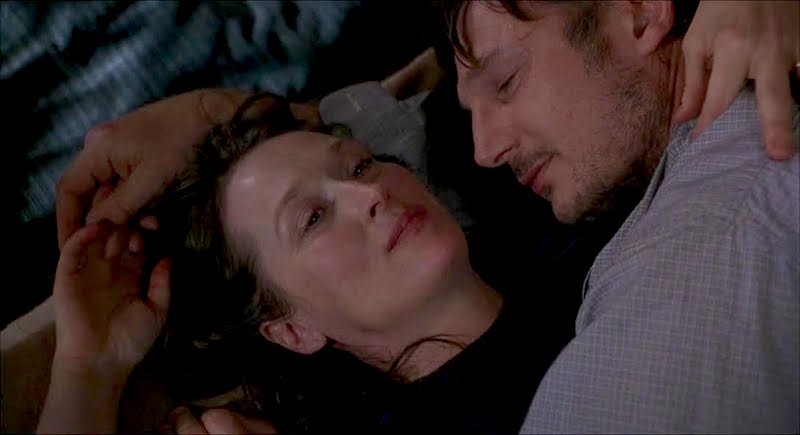
MATTHEW: As Streep uncomfortably, guilelessly insists on the truth in the face of Neeson’s gruff complicity and Molina’s shameless cynicism, I found myself trying to tap into the mind of this top-drawer thespian and work out why this drab character and cursory screenplay ever appealed to her. Neeson’s grandstanding Ben takes center stage early on and Streep’s Carolyn, who never once fears the worst about her son, becomes little more than an inactive witness to her family’s travails. She's a flustered observer in frequent need of reassuring — that is, when she’s not doing the half-hearted reassuring herself. (I should also note that an entirely unneeded post-arraignment sex-scene between Streep and Neeson contains the oddest, coyest series of cuts I’ve ever seen; it’s maybe the lone element worth preserving from Before and After, if only as a risible curio.)
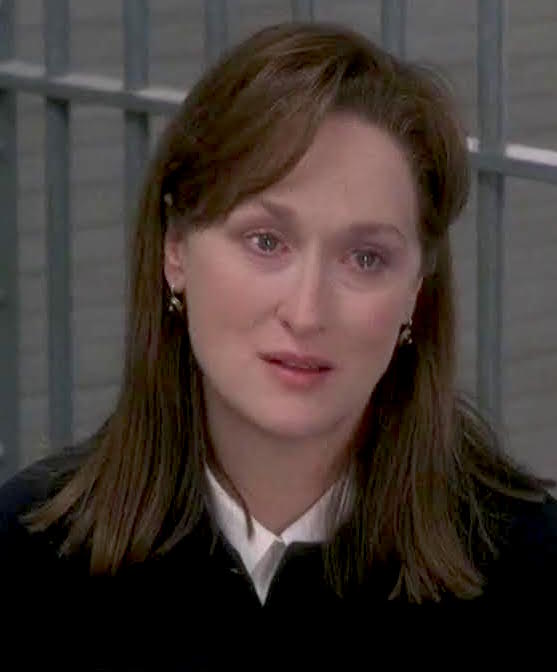 I wish I could say that a smart, sensitive, real-world woman fleetingly comes into focus, but Schroeder has no interest in shaping Streep’s brilliance into a whole human being. Instead, we are left with Streep looking positively radiant while blinking back beatific tears in a jail cell with her family as (spoiler, I guess) Jacob announces that he has decided to tell the whole truth and nothing but the truth to the court. I suppose Carolyn might be crying with relief that her son has at last absolved his soul of guilt and deceit. But I couldn’t help but see Streep weeping with the knowledge that if complex characters like Suzanne Vale and Francesca Johnson could be found before this stillborn fiasco then surely mid-career roles of equally rewarding richness could be found after it. And, thankfully, she would be right!
I wish I could say that a smart, sensitive, real-world woman fleetingly comes into focus, but Schroeder has no interest in shaping Streep’s brilliance into a whole human being. Instead, we are left with Streep looking positively radiant while blinking back beatific tears in a jail cell with her family as (spoiler, I guess) Jacob announces that he has decided to tell the whole truth and nothing but the truth to the court. I suppose Carolyn might be crying with relief that her son has at last absolved his soul of guilt and deceit. But I couldn’t help but see Streep weeping with the knowledge that if complex characters like Suzanne Vale and Francesca Johnson could be found before this stillborn fiasco then surely mid-career roles of equally rewarding richness could be found after it. And, thankfully, she would be right!




Reader Comments (20)
I totally agree with all being said in this piece. It was a struggle to sit through... This and House of Spirits are arguably the worst movies she has participated in.
Isn't this a tv movie? Opps thr's.... First do no harm, i keep mixing up these two movies o her! 😂
Barbet Schroeder made some very good movies, but it's true that his encounter with the couple Streep-Neeson could have been better
So Meryl's misfires are good. When she goes wrong she gives opportunity to other actress(es) come up.
The book this film is based on is fantastic. This movie is terrible.
The fact that there are so few comments says it all. I am a huge Streep fan and I've never seen this. I've never seen House of Spirits, Evening or Rendition. Thank you for this write up, but it seems like a good film to miss.
It's not bad, just medicore. Though yeah, it's sadly the only movie she ever played the role of a doctor. *sigh*
I can see (as well as for The House of Spirits) why she was interested in this character. One of the greatest fears of a mother/parent: could my child have been killed someone?
I do think in some scenes it flashes trough her.
I saw this years ago and have absolutely no recollection of any of it. Hmmm.
Should have skipped theatre and went straight to television.
I have absolutely no recollection of this movie ever being released!
The trailer sells it as a mystery thriller and it's a dull drama with one person under playing and the other over playing while the child actor steals this badly plotted film.
@Lady Edith The movies you mentioned ( all of Them ) are Streep's weakest.
Evening and Rendition ... she is each of them probably 10 minutes each.
Never heard of this film in my life. Not remotely interested in seeking it out.
This is a unbearable slog of movie. If I wasn't a Streep completist, I would have shut it off around minute 20. But, House of the Spirits is still the absolute worst; maybe because I loved the book so much and I hated the white-washing of the characters, hated Irons and Streep together (I also hated The French Lieutenant's Woman), and the ridiculous, plodding pace.
This one just feels icky and wrong on other levels. Lucky for you if you didn't waste your time on this film.
I always confuse this with First Do No Harm, even though they're fairly different. But both are very forgettable.
And any list of Meryl's worst movies needs to include The Giver!
Meryl's worst is her speech at the Democratic Convention. She should have used a chair.
Actually, Streep is really great in “First Do No Harm”, playing an everyday woman trying to hold it together while watching her son suffer from the medical treatments he is receiving. And since I assume it won’t be covered here since it was a television movie, I’ll just mention that it’s the first time she acted opposite Margo Martindale (playing a friend of the family) and Allison Janney (playing her adversary here, just a few years before she was cast as Streep’s girlfriend in “The Hours”). Also, she got to work opposite her Silkwood co-star, Fred Ward. Probably Streep’s most overlooked performance, in my opinion.
“Before and After”, on the other hand, is a complete dog. My second least favorite performance of Streep’s after HOTS which was just plain embarrassing. And I really, really hate to say it but Streep as a doctor was completely unconvincing!
I haven't seen it in a while, but I remember thinking it was not bad, just very low-key. The film has a good chilly atmosphere and the ending is poignant.
Never seen it. Only scenes on YouTube that look inert. Glenn Close told her she could improvise which now seems like a trap. I look forward to One True Thing.
This film was surely Streep's stay-close-to-home, post-Bridges payoff for her young family after being away in Iowa the year prior. Neeson's character is even a large-scale sculptor, just like Mr Streep, Don Gummer. There's a section in the first half where Streep's character inspects the scene of the (apparent) crime. It's memorable because she digs in the snow like an animal. An unexpected choice in a piece that was otherwise ordinary. She had high hopes for this film, having talked up a collaboration with Schroeder to journalists as early as 1993. Marvin's Room was the golden moment of this period in her career.